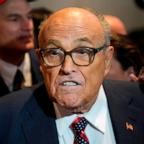Santorum Suspends Campaign, Leaving Super PACs Without Their Candidates
An ad man for Huntsman's spending group plans a big anti-Obama effort.
April 11, 2012 -- With the exit of Rick Santorum Tuesday, the Republican primary all but technically ended, leaving in its path a trail of money from people seeking to influence the race by donating to the super PACs, which have spent millions on negative ads against various opponents.
But there's no more opponents.
Three candidates have officially dropped out: Santorum, Rick Perry and Jon Huntsman. The super PACs supporting them had spent more than $14 million combined, and now they're floating in campaign finance purgatory — not spending any more money but not dead yet.
The Red White and Blue Fund, a super PAC backing Santorum, said that Santorum was "suspending his campaign but not the fight.
The PAC supporting Huntsman, Our Destiny, said that after the former ambassador quit the race, it returned all its unused money to the benefactors who had donated it. But the apparatus is still in place and "could spring into action" at a moment's notice for whatever reason, said Fred Davis, a Republican ad man who runs the PAC.
As the former candidates' super PACs wind down, though, new ones might crop up in time for the general election. Davis said he's lined up the main donors for a new general-election super PAC to fund ads targeting President Obama, though he wouldn't reveal their names or other people involved. He said he expects the PAC's war chest to be in the millions.
"The money's already here," Davis said.
"There is a lot at stake in November for our nation," Nick Ryan, the founder of the PAC supporting Santorum, said in a statement. "We can do better than Barack Obama. But not only the presidency is at stake. We also have the opportunity to strengthen the conservative majority in the House of Representatives and to oust the liberal leadership in the Senate."
Other PACs are forming in somewhat surprising ways — and campaign finance analysts tracking the activity find themselves in new territory fairly often, because the Citizens United Supreme Court ruling that gave birth to the super PACs is only a couple of years old. In late March, for instance, the Federal Election Commission allowed Rick Perry to create a new super PAC with the money that remained from his failed campaign.
While it's not uncommon for campaign money to be turned into PAC money, the lax rules that govern super PACs allow Perry to use the money in less restrictive ways. The FEC ruling also removes the restrictions on "coordinating" that officially separate campaigns from the super PACs doing their dirty work.
"One of the problems with the aftermath of a super PAC that is created to support a particular candidate is the fact that the money left over can be converted to personal use," said Fred Wertheimer, the president of Democracy 21, a group that has challenged the legality of the PACs. "Candidates cannot convert their contributions to personal use, but PACs can. That's just a loophole in the law that needs to be fixed."
Wertheimer predicted that the evolving arc of super PACs would bend toward congressional races, where rich benefactors can have more of a sway with their dollar because far less money is spent on House and Senate contests than on the presidential election.
"Anywhere there is a targeted race, there is potential for very large amounts of super PAC money funded by the super rich showing up to try to decide the election," he said.




